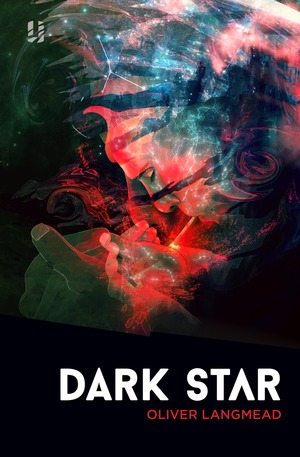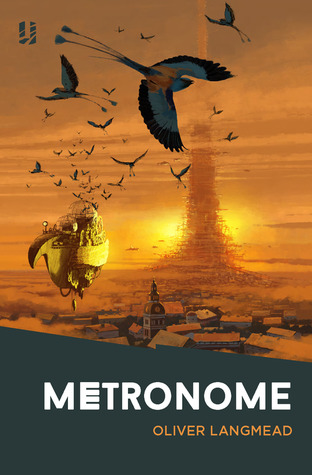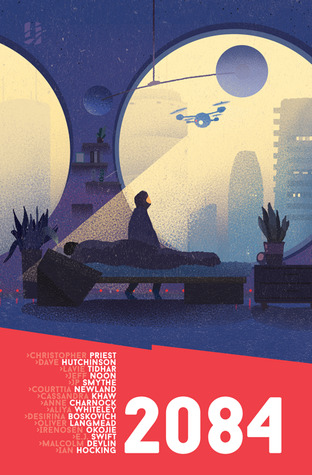Interview with Oliver Langmead
Oliver Langmead is the author of the science fiction noir epic poem Dark Star (2015) and surreal fantasy Metronome (2017), both published by Unsung Stories. His short story ‘Glitterati’ was one of the highlights of Unsung’s 2084 anthology of stories inspired by Orwell’s Nineteen Eighty Four (1949). He is studying for a doctorate at Glasgow University, and has recently completed a writing residency at the European Space Agency’s Astronaut Centre. Oliver Langmead was at CYMERA Festival in Edinburgh, and was kind enough to speak to The Fantasy Hive about his writing.
Welcome to the Hive, Oliver. You’ve been doing a residency with the European Space Agency. Would you be able to tell us a bit about that?
So, November last year I went and did a writing residency with the European Space Agency at their Astronaut Centre in Cologne. I did that because my doctorate involves me looking at different perspectives on climate change. Mostly examining a shift in perspectives, as espoused by Timothy Morton, from, say, the single turn of a key in the ignition of a car to the turning of thousands and millions of keys in millions of ignitions. And from that I came across a guy called Frank White, who wrote a book called The Overview Effect (1987), which is about what looking at Earth from space does psychologically. This is advanced by a lot of astronauts’ testimonies, where they say, looking down at Earth, you realise how fragile it is, how small it is, and how much we need to look after it.
This idea of Spaceship Earth, where if you think of the Earth as like a spaceship, we’re taking very poor care of it, as custodians. So from that I thought, cor, wouldn’t it be nice to speak to some actual astronauts! I happened to do another event at the Edinburgh science festival last year with a couple of absolutely fantastic people: Romain Charles, who looks after the astronauts’ families while the astronauts are in space, and Aidan Cowley, who does Spaceship EAC, which is a lot of the intern work at the European Astronaut Centre. I sent them off an email, like, “Oh, can I come and write poems about you for a bit at your astronaut centre?” I didn’t think anything would come of it. And then Romain sends me an email back saying he’d fired off my email to the second in command at EAC, who in turn sent it off to the guy in charge of the EAC. I mention this because the guy in charge of the astronaut centre is one of the most intimidating people I’ve ever met in my life. The intimidation began the instant I looked up his Wikipedia page. Because it’s one of those Wikipedia pages where you keep scrolling down, and it keeps getting better as it goes along. Frank De Winne is a war hero, test pilot, he’s been to space a few times, and by some convergence of events my little proposal ended up in his inbox. There’s me thinking, there’s no way on earth he ever gets back to me and says, ‘Yeah, yeah, come write some poems about us and the work we’re doing.’ But he said yes.
I asked for a month, they offered me three weeks, which is fair enough, then Creative Scotland were kind enough to give me the money to be able to do that. My proposal was to go and write poems about astronauts and people who work with astronauts, which is kind of where it’s going, I’m still working on that. Because poetry takes time, it turns out. But the actual three weeks was absolutely fantastic. I talked to some amazing people. It’s still surreal seeing astronauts walk around in the corridors like they’re normal people. It’s completely strange. And oddly enough, the person I had the most in common with was Samantha Christoforetti. She is incredible, been to space, come back, and recently released an autobiography about her time training with ESA and heading up into space. We had loads to talk about; about books, and her interesting takes on things like translation. And my favourite thing is that she said writing a book was the hardest thing she’s ever done, even harder than ever going to space. She was like, ‘Oh, just send me back up to space tomorrow, that’s fine, but I’m never going to write another book!’ I absolutely loved meeting Tim Peake, he’s extraordinary, and everyone who works with astronauts as well. The astronaut trainers, and even the facility itself was just extraordinary.
How does your creative work link to your academic work?
Because the strength of my academia is in the creativity. I’m doing a funny sort of doctorate; it’s a DFA, which is a doctorate in fine arts, in creative writing. It’s called practice as research. So I actually get to write a – I’m hesitant to call it a novel – a long piece of creative work and submit that as part of the thesis. I think it’s 80,000 words prose, or a few thousand lines of verse. I’m going to be somewhere in between, along with about 30,000 words of critical material. So the bulk of my work is still creative. I’m currently writing two books simultaneously, which, yeah, you can hear the anguish in my voice! But one of them’s nearly done, so we’re getting there. Outside of academia, I’m writing a prose novel that I can’t really speak much about because that’s the kind of thing I’m going to pitch at people soon.
But as for the doctorate, I’m writing another book-length poem, provisionally called Calypso, which feeds off my research into terraforming and ecology and the idea of shifting perspectives, looking at Earth from above. It’s a poem about terraforming and it’s a sort of science fiction adaptation of Paradise Lost, is probably the closest analogue. That still doesn’t really tell you quite what it does, but it explores a lot of things that I’ve been researching, such as post-human thought, terraforming and ecology, marrying the intimate with these vast perspectives. To try and have the reader experience a sort of mild overview effect is the aim of it, so that the reader gets these larger perspectives of what a planet is. Cause it’s almost a non-human thing, looking at it from above. A planet is not a human; it doesn’t care about us, it is indifferent to us, and just being able to see it that way should hopefully do something in the way of exploring ways of helping people come to terms with climate change and stuff like that. These are lofty goals that don’t really speak to some parts of the poem. It’s a lot more experimental than Dark Star, and I’m taking pains to make it as accessible as possible. I feel so sorry for the publisher! George [Sandison] at Unsung, he’ll inevitably get it, my agent will get it, but they’re going to be so stressed trying to find a way to publish this thing, because of the way some of it’s written.
The critical side of my work seems to be more focused on astronauts directly, their experiences of looking at Earth from above, but also people who’ve experienced a sort of secondary overview effect, which is people who work with astronauts and necessarily have to spend their days engaging with the kind of perspectives astronauts deal with. Which brings up some really interesting stuff to write about. There’s rumblings that I might be writing a sort of ethnology of astronauts in their natural habitats. But we’ll see how that comes together. It’s still early days. I have a year left. I have enough material to work with and bring together, to come up with something critical/creative.
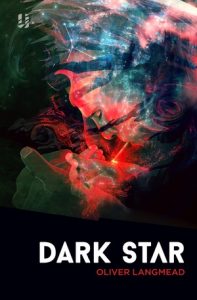 What was it like trying to get Dark Star, an epic poem that’s also science fiction and noir, published?
What was it like trying to get Dark Star, an epic poem that’s also science fiction and noir, published?
A bit niche? No doubt. Honestly, it all came down to a few extraordinary people who helped me a lot with getting to grips with how to sell it. The problem with publishing is that you need an advocate. You need someone who sees your work, loves it, and wants to get it to the right place. This is what agents are, this is what editors are; they end up being your advocates. This is occasionally what other authors are. If you find an author who loves your work, they know you should be getting published, and they advocate for you, that’s worth more than sending off a thousand emails, the shotgun effect, to end up in the slush piles. Luckily for me, I did a Masters in creative writing at Dundee, where I wrote Dark Star, and there were a couple of extraordinary people, tutors who kind of took to this weird thing I was doing. One of whom was Jim Stewart, who was an extraordinary influence on the poem, and sadly passed away a couple of weeks ago. And then there was Kirsty Gunn, who is one of my favourite people in the world, but when she takes to an idea she really takes to an idea, she does everything to get out there and get it into the right people’s hands. She sent it off to a few people. Then it ended up with agents, with editors, I ended up getting two offers on Dark Star, one from a publisher that no longer exists, and one from Unsung. So, I was speaking to an agent at the time, Robert Dinsdale, and I was like, ‘Rob, I have no idea what I’m doing here, which of these publishers should I be going for?’ And he absolutely brought me round to the correct choice with Unsung, cause I was veering towards the wrong choice, and George is brilliant, a fantastic editor who’s done some really extraordinary things with Unsung in getting these sort of “literary” works or challenging works to try and publish, because they are difficult to market. Like a science fiction poem! In the end I think it’s just through sheer passion and enthusiasm; it’s about getting it into the right people’s hands and having someone to advocate for it.
Epic poetry and noir fiction use very different forms of stylised language. How much of a challenge was it fusing these two voices?
Funnily enough it wasn’t as difficult as you might imagine. The lovely thing about the noir voice, the gritty cop on the edge, is that it gives you a lot of flexibility with syllables and meter, because of things like the wonderful expletive utterance, and you can use contractions. So getting to grips with something like pentameter, ten syllables a line, probably syllabic verse, with a voice like that was fun. Because I wasn’t wrestling with the kind of archaic monotonous tones of the classical epic voice, which I’m very critical of. It’s something that I use my work to interrogate a lot, find different ways of making epics cool again. Making long form poetry very accessible is something I’m concerned with. It turns out the noir voice is absolutely fantastic for it. The first drafts of the opening of Dark Star I wrote with that kind of very measured, dum de dum de dum de dum, metred tone, none of these contractions, Miltonic kind of verse. And it was fine, but then I re-watched Sin City, cause the voices in that are so completely absurdly noir, like over the top, gritty men on the edge. I just used that and I thought, if I do that, ten syllables to a line, it’s not going to work at all, and then it did. Which was a surprise to me as much as it was to my tutors, I think! Poor Jim Stewart, I came into his office thinking, ‘Oh, he’s going to hate this.’ But he sat there looking at it, and he was like, in my ten years of teaching I’ve never read anything like this. I choose to take that as the highest compliment. Cause it was a bit unusual!
What I’m doing now is going to be even weirder. Calypso is doing something very different. At its heart is a character, a woman who is going to turn into a garden. She is an analogue for Milton’s Eden and the terraformers using post-human engineering to create someone to catalyse part of the world. When I say it, it’s a bit boring, but when I say the heart of the poem is a woman who turns into a garden, that’s what I’m currently up to. Her verse form is a waveform, it’s a bit different, it’s going to disintegrate and do all sorts of interesting things. And I get to work quite closely with my lovely lovely illustrator Darren Kerrigan, to integrate actual images as part of the poem as well. So like I say, George is going to hate me, soon as he sees this poem. It’ll be like, ‘Ollie, how on Earth are we going to print this? You want to do WHAT with this page? A waveform, are you mad?’ We’ll see how that pans out, but maybe I’ll be finished next year.
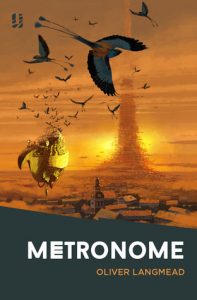 Both Dark Star and Metronome have those lovely Darren Kerrigan illustrations. How did you start working with him?
Both Dark Star and Metronome have those lovely Darren Kerrigan illustrations. How did you start working with him?
He just happens to be a friend of a friend. It’s funny, I went to his degree show. And you know how it is with degree shows, it’s mostly absolute nonsense with the occasional absolutely brilliant piece in there. And Darren’s works blew me away. His degree show piece was a lot of the white on black images like the image of Phos in the back of Dark Star, and it was all these incredible illustrations. And I was like, Darren, I’m about to give in my dissertation for my creative writing – which was basically the opening to Dark Star – and I was like, ‘Can you do me a really awesome illustration for the front of it?’ That’s where Phos came from, and I blame him entirely for both of my distinctions for my Masters, cause he illustrated both of them before I handed them in. One of those illustrations is yet to come out anywhere but I’m looking forward to finishing that book. I feel so privileged to be able to work with Darren because his work is extraordinary, and he works in so many different mediums. Like Phos, the Dark Star interior illustration was done white sketched on black, and then the Metronome illustrations were pencil then ink, then he’s doing oil painting for this new prose book I’m working on. And then for Calypso he’s using digital art. So he’s using every medium imaginable to do it, and he just happens to be incredible at all of it. Sooner or later I think we’re aiming to do a comic together. Which would be fabulous.
Is it very much a collaborative thing? Do you give him a brief?
Oh my god, I’m such a perfectionist. I’m really dreadful to work with, genuinely! He’s so patient with me, bless him. Cause Darren will bounce endless stuff off me before I’ll settle on something. I mean, I get to the place where I’m like, that leaf looks out of place Darren, can we fix that leaf? And bless him, bless him, he will do it until it’s perfect.
Both Dark Star and Metronome are very much outsider characters whose perspectives we don’t get a lot in science fiction. Is this something you were intentionally drawn to?
I much prefer writing broken people. I feel like my characters are pretty grim, though, and it feels like I’m reaching the end of an era when people are getting less interested in super grim characters. It doesn’t bode well. It seems to be a theme that’s continuing as well. The character in the prose novel I’m writing now is a heavily scarred immortal with memory problems, and then in Calypso – well, no, Calypso’s different, there’s a certain optimistic element to it. But yeah, it’s just much more interesting writing something that isn’t very two-dimensional I suppose. People really getting to grips with their flaws and trying to overcome them. Manderlay does I suppose, in a way. But outsider figures are way more interesting to write.
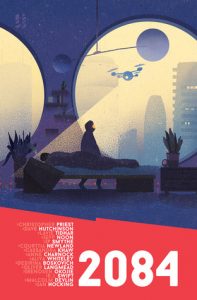 Your story ‘Glitterati’ in the 2084 anthology is one of the only ones in the anthology to approach Nineteen Eighty-Four in a humorous way. What was it that made you decide to approach writing about dystopia in this way?
Your story ‘Glitterati’ in the 2084 anthology is one of the only ones in the anthology to approach Nineteen Eighty-Four in a humorous way. What was it that made you decide to approach writing about dystopia in this way?
Funnily enough, my first draft for that anthology which kind of got rejected was really grim. It was ‘What if Scotland was like North Korea?’ I had such amazing things as a giant golden Alex Salmond statue, and a gigantic tower overlooking it, Holyrood Tower, and underground rings with the last tins of Irn Bru going round. There was a lot of orange vomit. Bright orange vomit. But George didn’t like it. It didn’t resonate, I wasn’t 100% happy with it, as fun as it was, but it was still really grim. So I took a step back, and I was like, I’ve got a band that I do a lot of aesthetic stuff with. We are called Surgyn. We haven’t done stuff in a while cause the other half of the band has moved to China. But we came up with this amazing dystopian aesthetic for the future where fabulousness is everything. We had this slogan splashed over everything like BEAUTY IS AGONY and FAKE WHAT YOU LACK and stuff like that. Which is just so much fun. And I just thought, it was always so much fun, I’m just going to translate some of this into a short story. And it ended up a cross between Ru Paul’s Drag Race and Nineteen Eighty Four, which is the weirdest combo, but somehow it works. Simone’s voice just came out straight away, and it all worked, and it all flowed beautifully, and my original grim draft kind of didn’t. And it’s a rare thing when that happens, when you get a story that just flows out of you, and it all comes together. Like Neil Gaiman with his ingredients, the cake just came together without much effort, which is usually a good sign that the short story is worth something. Obviously we batted back and forth about some of the details; I can tell you that the first draft of that story had a lot more exclamation marks in it. There were exclamation marks all the way through. I toned it down a little and it was still ridiculously over the top. Yeah. A lot of fun.
Music plays such an integral part to the plot of Metronome…
Maps as music. I can’t tell you where that came from. I dreamt a lot of those characters, genuinely, before they ended up on the page. I knew that Captain Reed – who was originally Captain Red, before I decided that was a bit too odd – had sheet music tattooed onto his face. And I was like, why? Why would that be? And it eventually came together that in dreams, music is maps; that’s how they navigate through dreams, following music, following pieces of music, and everywhere has its own piece of music. So it’s funny where these trains of thought get you. Manderlay was always a musician, and these two sides of it just came together, that he was the man with the map. And that was his way of getting involved in this completely ridiculous plot.
Metronome, explicitly with all the dream stuff, and Dark Star both have their share of surreal images. What draws you to this?
As a style, the thing that comes up most often from reviews and critics that I’m most pleased with is that I seem to be an aesthetic author. I come out with images, which is something that I think a few other authors do as well. The example I go to, which is an odd example, is C. S. Lewis, who always said ‘I write my books not through plotting, but through getting an image of what a scene should be, a flash of an image, just a spark of a thing.’ It can be as small a detail as sheet music tattooed into the face, or as large a detail as there is a body and the blood is glowing, filling this back street with light. And all of my best scenes tend to have that spark to them. Something you can see, something that really burns off the page almost. It’s quite extraordinary. I’m trying to use it to my advantage in the poem I’m doing right now, with the planetary perspectives, marrying these huge perspectives of planets and moons and the vast distances between worlds with something as intimate as a beach holiday, as prayer, as small gardens. Using imagery because it’s what inspires me, it’s how I write.
What’s next for Oliver Langmead?
We talked about this quite a lot, cause the funny thing is, as soon as you get a book published, it usually takes between a year and two years for a book to go from ‘I’ve handed it in to my agent’ to ‘it’s now a physical thing,’ by which point you’re always knee-deep in your next thing, and you don’t have the kind of brainspace to be able to properly celebrate what you’ve done. You don’t get to take a break for that long. I guess you can, but if you’re like me and you can’t stop working, then it keeps happening!
It’s been a while since Metronome. Two years. I’ve been working on a prose novel the last three years, which is the fifth complete draft of a book I’ve been working on for the past decade. It’s nearly finished. Couple of chapters away from finishing it, and I’m really excited to start pitching it to my agent and publishers, just because it’s the book that got me noticed in the first place by agents. It’s the best idea for a book I’ve ever had, so it’s always been the trouble of making the book as good as the idea, which is a problem, cause it has to live up to a certain standard, which is probably why it’s taken me so long! No, I’ll tell you why it’s taken me so long: because it’s full of characters that are cleverer than I am. Which is a real issue. Because I know I have one or two genuinely clever ideas per year, tops, and recognising that is difficult, so doing this over three years means there’s probably around six really clever ideas in there, at which point my characters are genuinely coming across as probably quite clever. Whereas it’s compressed into a book you can probably read in an afternoon, so it will feel really clever all the way through! That’s what I’m aiming for. So that’s nearly done. Again, that will probably take a while to get announced. And then there’s the poem that’s part of my doctorate. We’ll see if we can find a publisher sympathetic enough to the ridiculous things I’m doing with it. It’s funny, the closest analogue to the format, even if it isn’t a poem, is House of Leaves, and how that unfolds from page to page; how the format itself is part of the text, how it challenges you. So as soon as I send it off to my agent, I’m going to be like, please don’t scroll through this. So the first thing he’s going to do is obviously scroll through it. I’ll be like please don’t scroll through this because a big part of reading this is going to be experiencing this as it goes along. But as you can imagine, given that House of Leaves has never found a digital format that suits it because it’s impossible, finding a publisher willing to do that with something that definitely can’t be on an A5 book, this has to be A4 because of the way I’ve done it, and then agree to stuff like, this wouldn’t work digitally, this might work as audio maybe with certain things done to it, but a real challenge to publish, so I’m really looking forward to seeing who picks it up really, and what happens to it. Fingers crossed somebody does. But yeah that’s about it right now. I don’t really write much in the way of short stories, which is dreadful. I get through one every three or four years, compared to books which just kind of come out of me. But yeah, that’s about it for now, finishing off the doctorate.
Has any of your other stuff been done on audio?
Yes. Dark Star is on audio with a fantastic voice actor. We spent ages trying to get the right voice actor for that. I worked with Audible on that. I really dislike Amazon, but I love Audible, because they’re such lovely people. I guess Amazon are putting their money in the right places. We were looking at loads of Shakespearean voice actors for that, proper stage actors, who could get to grips with the kind of rhythms that Dark Star was, but in the end, I put my foot down and I was like, maybe we just need a guy with a really gravelly voice who sounds like he’s on his last legs and has smoked every day of his life. And we ended up getting this really absolutely brilliant guy who did the voice, he did some voice acting for one of the Amnesia games, he does a lot of the 40k novels oddly enough, as well as a lot of noir. But that’s a brilliant audiobook, I can’t recommend it enough. And Metronome we had a fantastic Scottish voice actor, and he did such a fantastic job with that. The problem with Metronome is there’s a different accent on every page. He absolutely did his best with it. And the result is really fun. It’s especially good for stuff like poetry, especially Dark Star, because epic poetry comes from an oral tradition, so it was always orated before it was written down, so for years I was going on at my lovely agent being, oh, can we get an audiobook? And one day he sent me a text saying ‘Hey, Audible want it’ and I was like ‘Yes! Finally it’s happened.’
In the event you talked about how you read your work aloud when writing. Have you ever done any audiobooks yourself?
I hate the sound of my own voice unless its heavily distorted, so no, but a friend of mine is kind of looking into that. I know recordings have been made of some of the stuff I’ve done. Because I love performing. I do it as regularly as I’m able. I’ll tell you something interesting that came to mind. One of the reasons why Calypso is going to be very interesting if they do make an audiobook out of it, is because at least one point in the book, maybe multiple times, two voices are going simultaneously. Because I have a post-human character who can listen to and interpret two people talking simultaneously, and I thought it was a really nice effect to put that down on a page, as a way of showing what cognitive enhancement can do. I’ve performed that a couple of times with a friend of mine, at different places, with both of us reading aloud. And I’d be really interested to see what they do with that in terms of audio if they choose to go with that. But we’ll see, cause it’s a tough one to publish. I’m excited about it but we’ll see if anyone else is.
Thank you Oliver Langmead for speaking with us!
Oliver Langmead is the author of Dark Star, Metronome, and the short story ‘Glitterati.’

